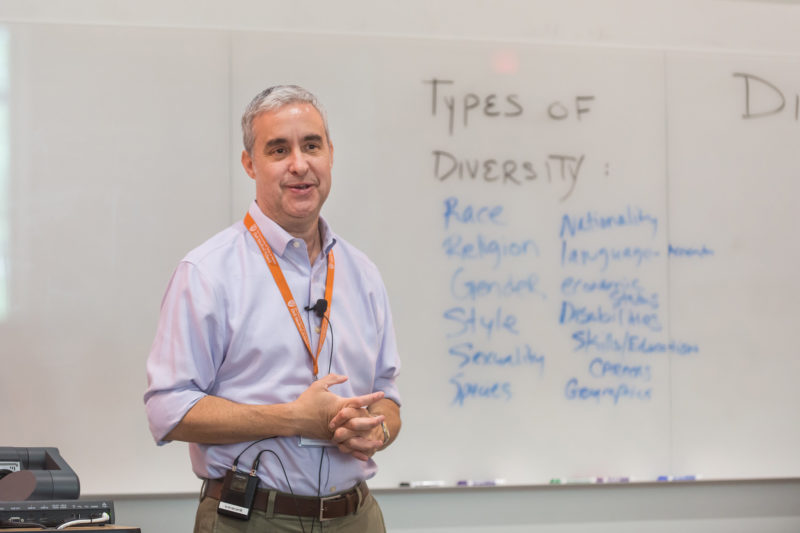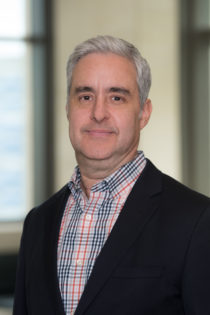UT Dell Medical School’s Unconscious Bias Training Seeks to Improve Awareness in Healthcare
By Sunny Kim
Reporting Texas

Rene Salazar talks to a middle school class about diversity at the Health Sciences Summer Camp in 2017. Photo courtesy of Dell Medical School
Learning how to identify one’s own unconscious biases is required of every student entering their second year at Dell Medical School, and second-year medical student Katie McNiel appreciates the training.
As a white woman who grew up in Austin, she recognizes that she has unconscious biases about people of a different socio-economic status or race. It’s important to address them, especially as a healthcare professional, because the biases could lead to unintentional actions that can contribute to health inequities, she says.
“It exists and could affect how I interact with people, and I don’t want it to,” McNiel said. “I have to recognize that to address it and make sure that it doesn’t impact my interactions with my colleagues and patients.”
Bias in healthcare delivery has become a flash point nationally in part because of high maternal mortality rates among African-American women. In Texas, black mothers are dying at 2.3 times higher rates than white mothers, regardless of income, education, marital status or other health factors, according to a September 2018 report from the state’s Maternal Mortality and Morbidity Task Force. Michele Rountree, an associate professor at the University of Texas at Austin who specializes in the health and wellness of black women, says one way to improve those outcomes is to uncover unconscious bias that might affect treatment decisions by healthcare practitioners.
The UT-Austin Dell Medical School requires all rising second-year medical students to participate in a 90-minute unconscious bias training, says Rene Salazar, assistant dean for diversity at the Dell Medical School. Students also talk about bias during freshmen orientation, Salazar said.

Rene Salazar
“Providers may treat black patients differently based on how they communicate to them, what tests they order, what tests they don’t order,” Salazar said. “As a doctor, my intentions are to take care of everyone equally, but unconsciously I may be doing things that don’t necessarily fall in line with that explicit belief.”
The training starts with a conversation about bias and, particularly, unconscious bias — attitudes and stereotypes that affect our understanding of, actions toward and decisions about certain groups of people based on race, age, gender or other factors, Salazar says. The conversation focuses on the importance of understanding our own implicit or unconscious biases, he says.
After the 90-minute training, students are encouraged to take the an implicit association test online to explore their own unconscious biases and what they can do individually to reduce that bias, Salazar says.
There are multiple implicit association tests that focus on a variety of different factors such as race, age, sexuality, disability and religion. Dekoiya Burton, who is a second-year Dell Medical student, says the test asked him to rank people on desirability based on their physical appearance. It confirmed his biases against men and LGBTQ people, Burton said.
He added that it’s important for these conversations to happen because healthcare professionals are prone to biases just like everyone else.
“It’s super important for us to talk about it, especially if we want to be a community and society that really minimize the disparities,” Burton said.
David Acosta, chief diversity and inclusion officer at the Association of American Medical Colleges, says a “staggering” 85 percent of medical schools in the U.S. have some sort of training focused on unconscious bias, cultural competency or health disparities. Few of the training sessions are mandatory, however, Acosta said.
“We don’t have a standardized curriculum that is based on how we understand structuralized racism and institutional racism,” he said.
The training at UT Dell Medical School aims to provide both mandatory and optional ways in which students can get involved, Salazar says.
“We’ve trained most of the faculty and staff and everybody who’s part of UT Austin clinical enterprise as part of their onboarding process,” Salazar said.
Salazar created the first unconscious bias program in 2013 as director of diversity at the University of California-San Francisco’s graduate medical education program. The program had reached 3,000 people by the time he left, Salazar says. When he moved to Texas in 2016, he brought the program to Dell Medical.
Dell Medical is trying to take a “multi-faceted approach” to the training by including sessions on disabilities, sexual orientation, gender and gender identities, Salazar says.
Bias training has to be more than just another box to “check off,” Salazar says.
“It’s just the beginning of a conversation,” Salazar said. “It’s about starting dialogue, and we’re trying to make sure that we maintain the conversation throughout people’s experience and that it’s not just a one-and-done.”